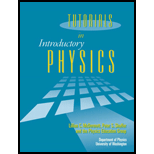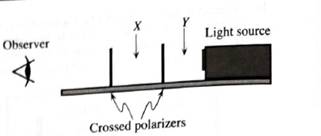
An observer is looking at a light source through two polarizers as shown in the side view diagram at right. The polarizers are crossed, that is, they are oriented so that the light transmitted through them has minimum intensity.
1. Suppose that a third polarizer were inserted a, the position marked X, shown above.
Predict how, if at all, this change would affect the, intensity of the light reaching the observer. Does your answer depend on the orientation of the third polarizer? Discuss your reasoning with your partners.
Check your prediction experimentally. (Ask a tutorial instructor to show you the equipment that you need in order to do so.) If your prediction was incorrect, identify those parts of your prediction that were wrong.
How can you apply your results from part D to help you account for your observations? Support your answer with one or more diagrams.
2. Suppose that instead a third polarizer were inserted at the position marked Y, shown above.
Predict how, if at all, this change would affect the intensity of the light reaching the observer. Does your answer depend on the orientation of the third polarizer? Discuss your reasoning with your partners.
Want to see the full answer?
Check out a sample textbook solution
Chapter 11 Solutions
Tutorials in Introductory Physics
Additional Science Textbook Solutions
College Physics: A Strategic Approach (4th Edition)
Conceptual Integrated Science
Essential University Physics: Volume 2 (3rd Edition)
Life in the Universe (4th Edition)
Physics for Scientists and Engineers: A Strategic Approach with Modern Physics (4th Edition)
University Physics (14th Edition)
- Hi! Please read everything first before answering. Read carefully as well because you might be confused.I asked this question already here in Bartleby but I have not received the exact answer The question is:Unpolarized light with intensity I₀ is incident on two polarizers as sketched in Figure B. Suppose the angle between the axes of the two polarizers is θ = 60°. What is the intensity of the transmitted light? EXPRESS YOUR ANSWER AS A FRACTION OF I₀. And I got the answer 0.125 I₀. The question says THE ANSWER SHOULD BE EXPRESSED AS A FRACTION OF I₀. The answer I got is decimal and i don't know how i will turn it to fraction. I am not sure if converting it to fraction is correct so I am seeking for your help. Please help me. What I just need is TO EXPRESS MY ANSWER AS A FRACTION OF I₀. Thank you!arrow_forwardPlease use the picture provided to answer the following two questions: 1. are the two sources in phase or out of phase? Explain how you can tell from the diagram. if the two sources are out of phase, give the phase difference between the two sources. Explain. 2. What is the source separation, d, in terms of the wavelength lamda? Explain your reasoning.arrow_forwardPlease compute the case problem a, b, and c:A 1,000 lumen source is 4 meter away from the center of a screen.The edge of the screen is 5 meters from the light source.a. What is the intensity of the light falling on the center of the screen?b. What is the intensity of light falling on the edge of the screen?Formula:E = I/d^2 Where : E = is the intensity of the light on the object,lux (lx) or foot candleI = is the intensity of the light at the source,lumen (lm)d = is the distance of the light source from the object,meters or ft. Example Problem1. If the magazine is 2m from the 100 lumen source, what is the intensity of the light failing on themagazine?E = I/d2E = 100/22E = 25 luxarrow_forward
- Solve the problem below (E1) AND use the photo of the five steps to solve it.arrow_forwardUnpolarized light with intensity I 0 is incident on an ideal polarizing fiter. The emerging lipht strkes a second ideal polarizing fiter whose axis is at 380 ∘ to that of the frist. Determine the intensity of the beam after it has passed through the second polarizer Express your asnwer as a multiple of intensity I 0 . Part B Determine its state of polarization The inght is ineatly polarized along the axis of the first fiter The ught is inearfy polarized along the aus of the second fiter The light is inearly polarized perpencicular to the avds of the second fiter. The loht is inearly posarized perpendcular to the avs of the first fiter. No gpt please,hand written pleasearrow_forwardMy answer is incorrect, please write find my wrong in my explanation(process detail). I attach the image of my process of explanation and the professor's process(blue color) 2. When discharging a capacitor in an RC (resistor-capacitor) circuit, the charge Q varies according to the equation:????? +??= 0where R is resistance, C is the capacitance (both constants). Find a function for the charge stored inthe capacitor: (There’s no need to know anything about electronics or physics to do this problem. R and C are just constants—just do the math.)?(?) = _____________________________________________arrow_forward
- A light wave in vacuum has a frequency of 3.00 x 10¹4 Hz and an intensity of 810 W/m². s What is the wavelength of this light wave? Show your work. What is the magnetic field amplitude of this light wave? Show your work.arrow_forwardA beam of light traveling through air is incident up a transparent material at an angle of 0;=78.02 degrees as shown in the image below. If the angle of the transmitted ray (0t) as measured with respect to the direction normal to the surface of the material (dashed line in the image below) is 32.46 degrees, what is the index of refraction of of the material? Normal Reflected Incident ray ray Transmitted ray Note: Do not explicitly include units in your answer (the index of refraction is a dimensionless quantity, anyway). Enter only a number. If you do enter a unit, your answer will be counted wrong.arrow_forwardState clearly the principle of Physics that you are using (invoking is the scientific word). Explain (briefly) your methodology. Give any equations that you may use A laminated window consists of Perspex and glass. At the Perspex to glass interface the angle of refraction is 25.00. and the angle of incidence is 150. If the refractive index of the glass is 1.60, what is the refractive index of the Perspex?arrow_forward
- a) Two polarizers are arranged as shown in the figure below. If the incident beam of light is unpolarized and has an intensity of 2.2 W/m2 , find the transmitted intensity if Theta 3 =90 degrees Give all of your answers to 3 sig fig. I = Answer for part 1 W/m2 b) Your friend added a third polarizers in between the two previous polarizers. If the angle of the second polarizers is tilted with an angle of 35 degrees compared to the first polarizers what is the light intensity that gets out of the second polarizers? I=_____ for part 2W/m2 c) What is the angle made by the second and the third polarizer? Theta=________ degrees d) What is the intensity of the light after it passes through the third polarizer? I=________W/m2 Please show full work!!arrow_forwardIn the picture to the right, a light ray traveling in Medium 1 is incident on a boundary with Medium 2. The light ray is then shown traveling into Medium 2. a) On the picture, draw the appropriate normal line. b) Does light travel faster in Medium 1, in Medium 2, or is the speed of light the same in both? Explain briefly in words. Medium 2 Medium 1arrow_forwardHelp mearrow_forward
 College PhysicsPhysicsISBN:9781305952300Author:Raymond A. Serway, Chris VuillePublisher:Cengage Learning
College PhysicsPhysicsISBN:9781305952300Author:Raymond A. Serway, Chris VuillePublisher:Cengage Learning University Physics (14th Edition)PhysicsISBN:9780133969290Author:Hugh D. Young, Roger A. FreedmanPublisher:PEARSON
University Physics (14th Edition)PhysicsISBN:9780133969290Author:Hugh D. Young, Roger A. FreedmanPublisher:PEARSON Introduction To Quantum MechanicsPhysicsISBN:9781107189638Author:Griffiths, David J., Schroeter, Darrell F.Publisher:Cambridge University Press
Introduction To Quantum MechanicsPhysicsISBN:9781107189638Author:Griffiths, David J., Schroeter, Darrell F.Publisher:Cambridge University Press Physics for Scientists and EngineersPhysicsISBN:9781337553278Author:Raymond A. Serway, John W. JewettPublisher:Cengage Learning
Physics for Scientists and EngineersPhysicsISBN:9781337553278Author:Raymond A. Serway, John W. JewettPublisher:Cengage Learning Lecture- Tutorials for Introductory AstronomyPhysicsISBN:9780321820464Author:Edward E. Prather, Tim P. Slater, Jeff P. Adams, Gina BrissendenPublisher:Addison-Wesley
Lecture- Tutorials for Introductory AstronomyPhysicsISBN:9780321820464Author:Edward E. Prather, Tim P. Slater, Jeff P. Adams, Gina BrissendenPublisher:Addison-Wesley College Physics: A Strategic Approach (4th Editio...PhysicsISBN:9780134609034Author:Randall D. Knight (Professor Emeritus), Brian Jones, Stuart FieldPublisher:PEARSON
College Physics: A Strategic Approach (4th Editio...PhysicsISBN:9780134609034Author:Randall D. Knight (Professor Emeritus), Brian Jones, Stuart FieldPublisher:PEARSON





